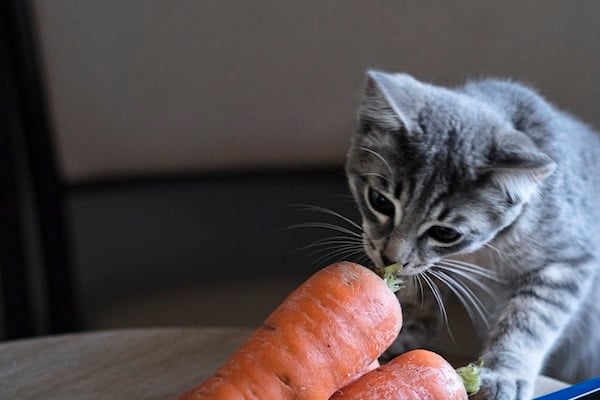- Not a substitute for professional veterinary help.
Vegetables, in small doses, can be a healthy way to introduce diversity to your cat’s diet. While they need a primary diet of meat protein, they also benefit from the nutrients in some vegetables. Cats can eat carrots, for example—but there are some do’s and don’ts.
For guidelines, we turned to Dr. Katherine Oakes, Clinical Nutrition Intern at the Veterinary Health Center at Kansas State University. She says that people commonly think “obligate carnivore” means cats can only eat meat. But cats need protein, carbohydrates, fats, vitamins, and minerals the same way that dogs—and humans—do.
“‘Obligate carnivore’ simply means that cats require protein and cannot live on a vegetarian diet alone,” she explains. “Many cat foods contain carrots and other vegetables.” With Dr. Oakes’ help, we review how and when it’s okay to offer your cat carrots.
Health Benefits of Carrots for Cats
Carrots have several vitamins and minerals that benefit cats. While your feline will get these nutrients from a regular well-rounded diet of quality cat food, carrots served as a treat can offer a healthy low-calorie boost of:
- Vitamins E and K—E is an antioxidant, and K is necessary for blood clotting
- Fiber—regulates the digestive system and promotes healthy bowel movements
- Magnesium—assists with urinary and bowel functions
- Potassium—helps regulate muscles, nerves, and heart function
- Phosphorous—plays a key role in bone and tooth formation as well as energy level
While carrots contain beta carotene, which some animals convert to vitamin A, this doesn’t happen for cats. So carrots aren’t particularly useful for getting your cat their vitamin A—stick to their regular diet for that.
Avoid Feeding Too Many Carrots
Compared to other vegetables, carrots are high in sugar, says Oakes. Moderation is key, and feeding too much of any food, including carrots, can imbalance your cat’s diet and cause digestive problems.
It’s unlikely that carrots alone, in small amounts, can cause feline diabetes, but overfeeding can cause health issues. Your cat’s regular cat food regimen should comprise 90% of their daily calories, while the other 10% can include carrots in rotation with other cat-safe foods.
If you want to experiment with adding carrots to your cat’s daily diet, consult your veterinarian.

Yelena Shander via iStock
How To Serve Carrots in Moderation
Always thoroughly wash carrots. Cats can eat all parts of a carrot safely; however, they should always be peeled, and the best way to serve them is cooked and unseasoned. Boiling, steaming, and baking will all work to make carrots softer and reduce your cat’s risk of choking.
Why not raw?
Generally, says Oakes, raw carrots can be a choking hazard unless they are grated finely or cut into very small pieces. It can be simpler and safer to serve them cooked.
While juicing eliminates the choking issue, it also eliminates all the fiber via the discarded pulp while the sugar remains. That makes juiced carrots nutritionally inefficient for your kitty.
Should kittens eat carrots?
While a small amount of cooked carrots won’t be harmful, it’s best to keep kittens on food that is specially formulated for their developing system. That food will be higher in protein from meat than adult formulations. Wet kitten food is especially good because the higher moisture content helps ensure your young cat is getting enough water, and it’s softer for still-growing teeth.
Other Cat-Safe Vegetables
While cats can eat carrots, there are also other veggies that you can try mixing into your cat’s diet for variety and nutrition. Oakes suggests broccoli, cauliflower, and cucumber as all being equally good options—so long as they’re cooked, handled safely, and given in moderation.
There are some key veggies to avoid giving your cat, too. Garlic, onions, chives, leeks, wild mushrooms, unripe tomatoes, and avocado are all toxic. Canned veggies with added salt or seasonings are also big no-nos.
Always verify that a human snack you want to share with your pet is safe, says Oakes, and contact a veterinarian immediately if your cat has consumed something toxic.



